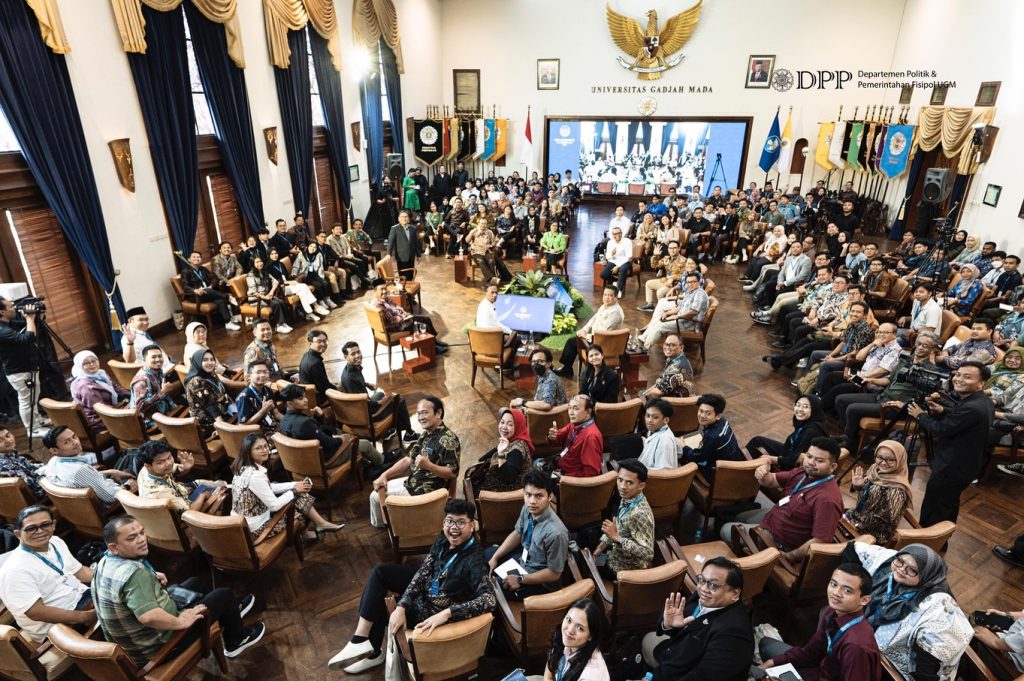
Multi-Stakeholder Collaboration: Political and Technical Solutions Offered by the Bulaksumur Roundtable Forum in Managing the Dilemma of Decentralization and Sustainability.
Yogyakarta, August 9th 2024 – The Department of Politics and Government at Universitas Gadjah Mada (DPP UGM), through the Collaborative Hub for Politics and Policy on Sustainability (CoPPS), today held the Bulaksumur Roundtable Forum (BRF) at the UGM Senate Hall. BRF is a testament to DPP UGM’s seriousness in guiding the transformation of decentralization in managing the dilemmas of sustainable development.
In the opening remarks, Abdul Gaffar Karim, Chairperson of the Bulaksumur Roundtable Forum, stated, “What we may not always realize is that not all good things can support other good things. Sometimes, good things can become dilemmas for each other.” This view was reinforced by Prof. Purwo Santoso, who said, “The concept of sustainability is complex, between a blessing and a curse.”
By grouping regions based on certain characteristics, policies can be more specific and effective. Additionally, periodic reviews of existing policies are needed to ensure they align with sustainability principles.
Prof. Haryanto, a UGM local politics expert, stated, “We can try combining symmetrical and asymmetrical decentralization. Regions based on their potential and objective conditions are grouped using certain indicators, and decentralization policies are applied based on the typology of the region.”
“There could also be collaborations to encourage central-local cooperation based on mutual trust,” Haryanto added.
Drs. Syarmadani, M.Si, Director of Domestic Politics, Directorate General of Politics and General Government at the Ministry of Home Affairs, revealed, “Multi-stakeholder forums function to open dialogues that expand decision-making options. The private sector can provide support, science, and innovation.”
Thomas Umbu Pati, Deputy for Development Control at the Nusantara Capital Authority (IKN), stated, “IKN is referred to as a ‘civilization leap’ – a hybrid government, with local government authority handed over to the authority. This policy was made to address authority contestation between government institutions. This authority must be applied with the following conditions: accountability, inclusivity, green, resilience, and sustainability.”
Neneng Goenadi, Country Managing Director, Grab Indonesia, emphasized, “In the context of social, economic, and environmental sustainability, transformation is essential. Technology is developing very quickly, so it is crucial for the government and industry to learn together to remain relevant with all these changes. With such dynamic changes, a normative approach is better than a prescriptive one, because overly prescriptive regulations can hinder industrial innovation.”
Meanwhile, according to Silverius Oscar Unggul, Vice Chairman of the Environment Sector at KADIN, “Downstreaming must be balanced with upstreaming, which could be Indonesia’s strength in the future. Raw material regeneration. Forests with replanting regeneration.”
This Bulaksumur Roundtable Forum offers practical and technical solutions. Political solutions require the promotion of green leadership and collaboration to encourage cooperation between the central and local governments, as well as between the government, business, and society based on mutual trust. Technical solutions involve regional typology division to combine symmetrical and asymmetrical policies.
“CoPPS facilitates multi-stakeholder communication to manage dilemmas and integrate sustainability initiatives into Indonesia’s political and policy landscape, particularly in the green and blue economy sectors,” said Ian Agisti, Program Lead of CoPPS. “With the Green Leadership strategy, the Bulaksumur Roundtable Forum (BRF) will be the opening program,” he added.
The Bulaksumur Roundtable Forum will become a regular program, focusing on sustainability and featuring high-level discussion forums from various sectors.
Contact
Endah Ayuning R
endahayuning@mail.ugm.ac.id
082245313792
About CoPPS
CoPPS (Collaborative Hub for Politics and Policy on Sustainability) is an initiative of the Department of Politics and Government at UGM and Pares, aiming to unite various stakeholders to promote and integrate sustainability initiatives into Indonesia’s political and policy landscape. With the goal of creating a better future for the nation, CoPPS focuses on the green and blue economy sectors. The strategy used is collaboration and green leadership. The Bulaksumur Roundtable Forum is the flagship program focused on high-level discussions.
About the Department of Politics and Government at UGM
The Department of Politics and Government (DPP) is the new name used since January 2016. This new name is related to the institutional restructuring process at Universitas Gadjah Mada, particularly the re-grouping of postgraduate programs following academic disciplines. Programs with the same discipline, both at the undergraduate, master’s, and doctoral levels, are grouped into one department. After the 2010 restructuring process, DPP manages the Master’s Program with five concentrations (Local Politics and Regional Autonomy, Indonesian Politics, Election Governance, Natural Resource Governance, and Human Rights and Democracy), as well as the Doctoral Program in Political Science.
Before this new name, DPP was called the Department of Government Politics (JPP) from 2010 to 2016, and before that, the Department of Government Science (JIP) from 1955 to 2010.
About Pares
Pares is a dynamic community committed to addressing society’s pressing issues through collaboration and innovation. Pares unites various voices from the government, civil society, business, and academia to develop and implement practical solutions.
Pares’ main focus is policy advocacy, inclusion, and strengthening political literacy. Pares works across various issues, including public policy, public services, elections, technology governance and the digital society, the environment, and natural resources.

